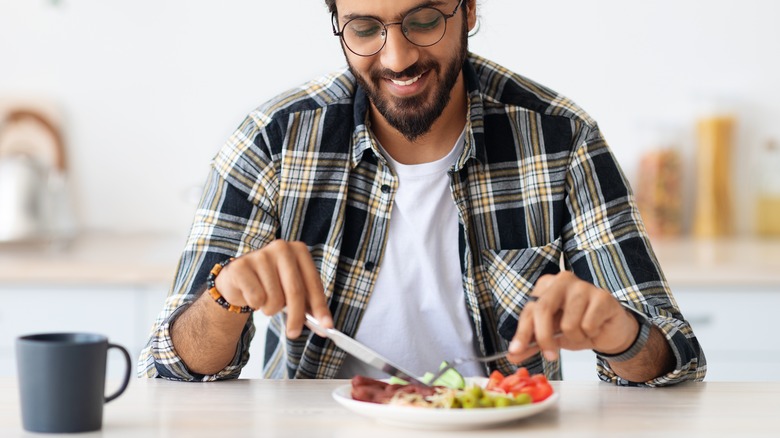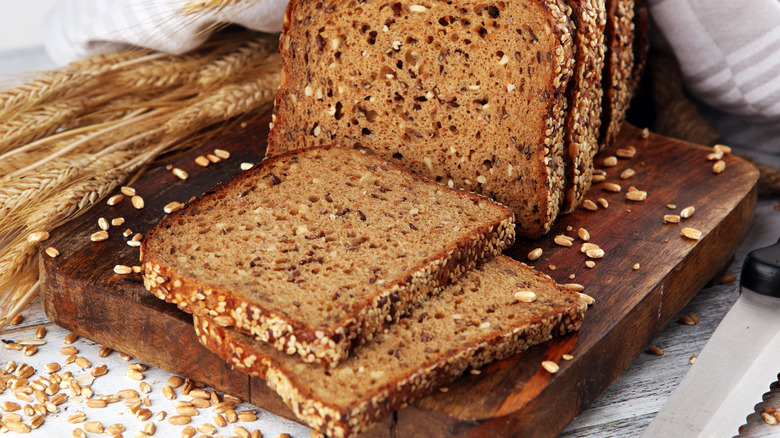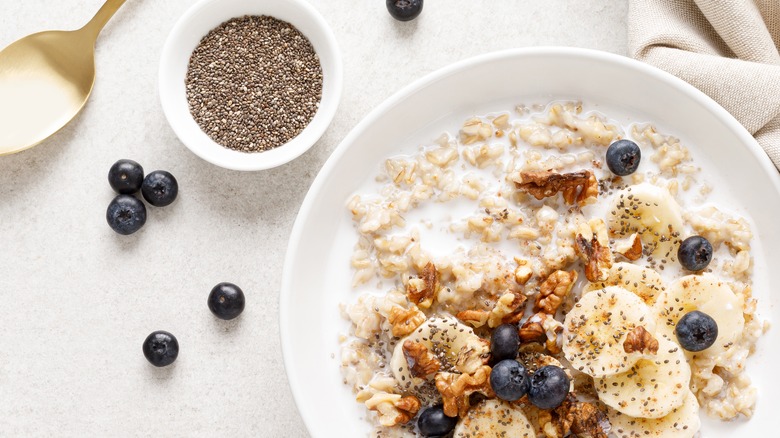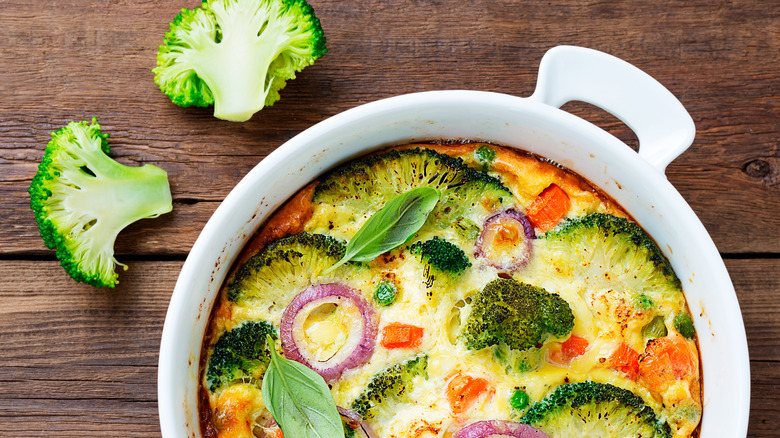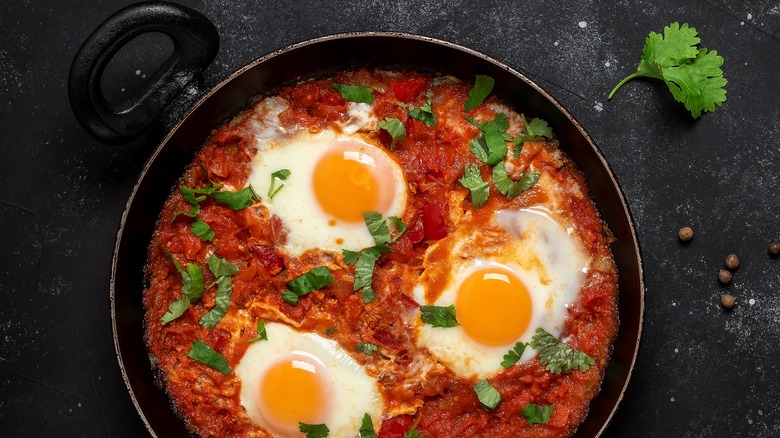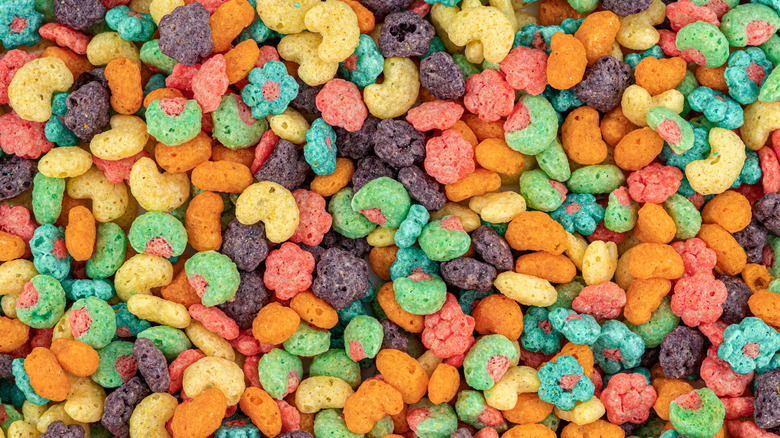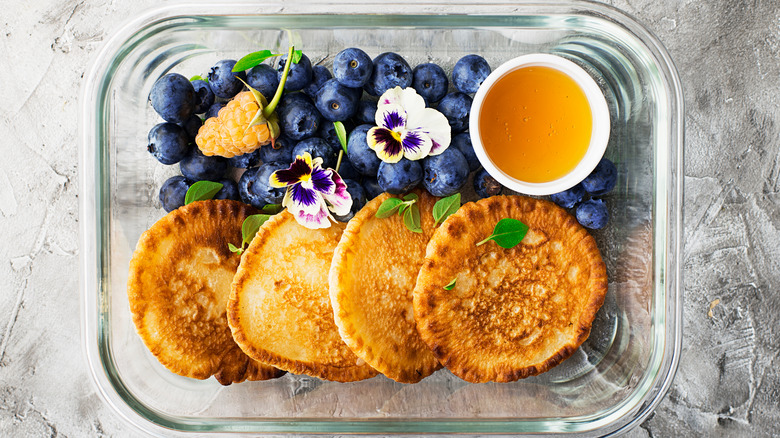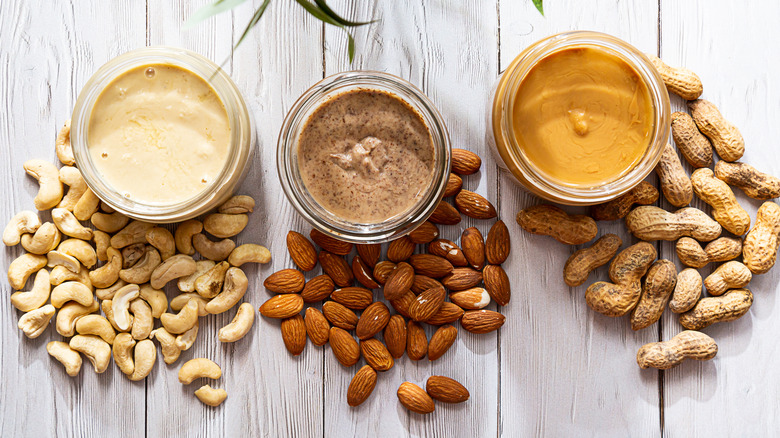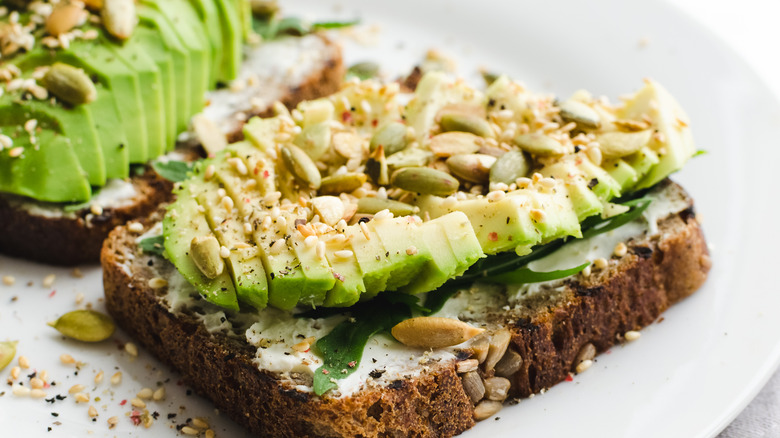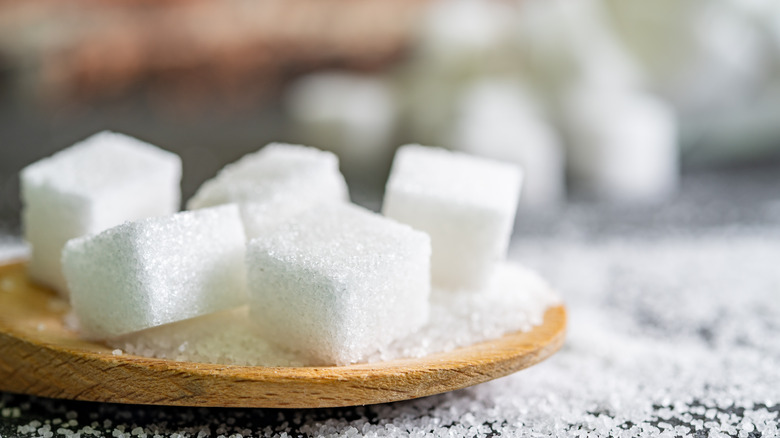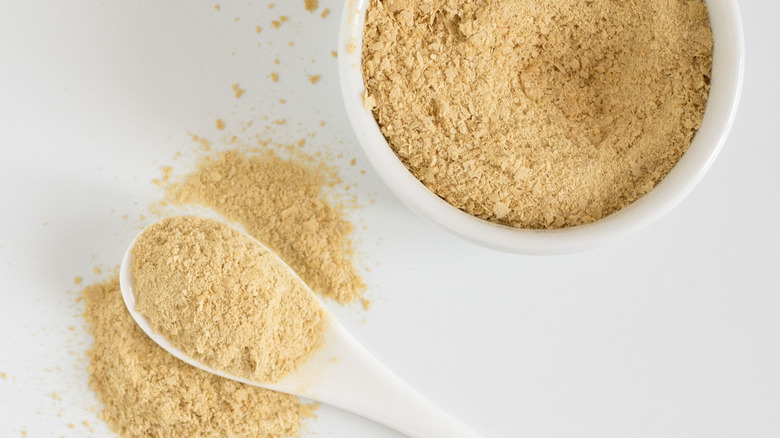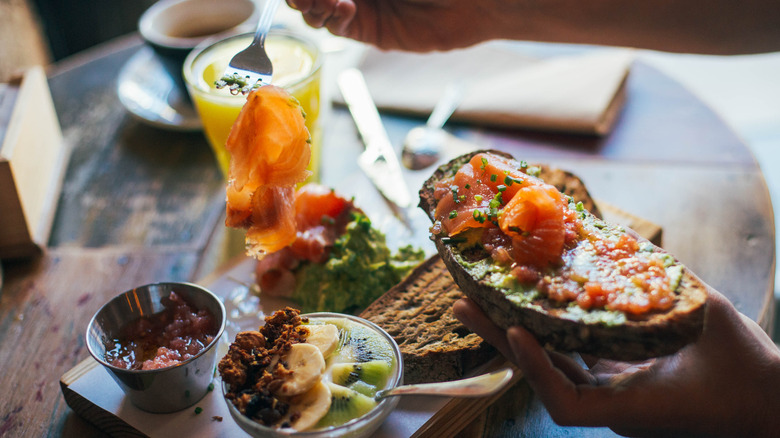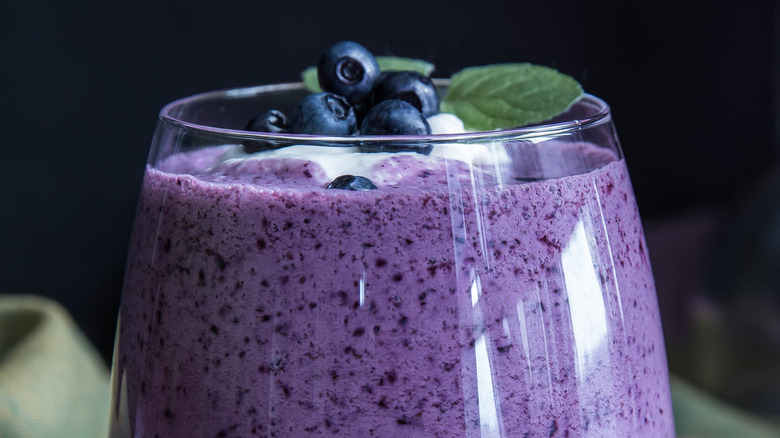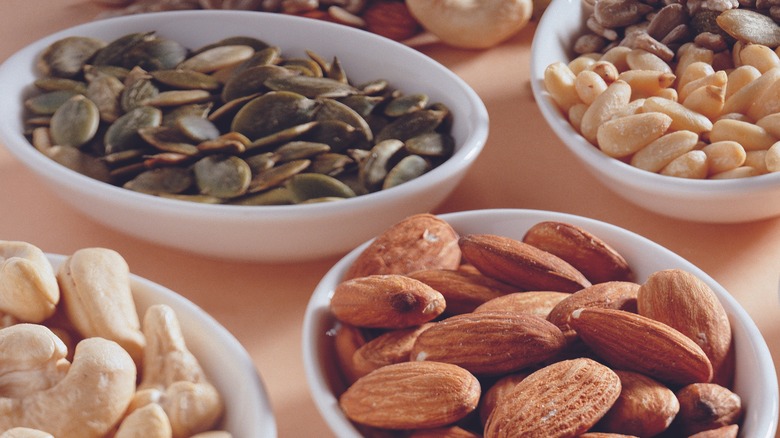Tricks To Make Your Breakfast Healthier
So we're gonna say something here that you may never have heard before, folks: Breakfast is, apparently, the most important meal of the day. Shocker!
But while you might be sick of being told about the importance of breakfast, there's little denying that eating a nutritious meal after waking up can do wonders for your health. Making sure you get a good breakfast every day could help to limit your risk of getting heart disease, type 2 diabetes, and experiencing weight gain, according to registered dietitian Melinda Gong (via UC Davis Health). A hearty, healthy breakfast will also allow you to maintain focus throughout your day, and bolster your brain health.
But here's the kicker. Despite seemingly endless streams of positive information about how eating healthy breakfasts can benefit you, one in five adults still don't do it, ever, according to statistics published in Kitchen Infinity. And of the people that do eat breakfast, way too many fall back on easy, convenient options, that may be doing you more harm than good. We're well aware of how trying it can be to make healthy choices when you're still waking up and starving from the night before, and that's why we put together this list of tricks to help you make healthier choices during breakfast-time. Let's take a look.
Swap out refined grain foods for whole grain versions
For a lot of people, it's hard to imagine a breakfast without bread featuring somewhere. But if your bread is the white, refined variety, for a quick health-boosting trick, you're far better off switching to a whole grain loaf instead.
Refined grains undergo a milling process whereby parts of the grain are removed, and in doing so, a large number of nutrients are lost from the food, the Mayo Clinic states. By switching to whole grains, you keep those nutrients firmly on your breakfast table, with important vitamins like iron, folate, potassium, selenium, and B vitamins supplied in richer quantities.
Whole grains are also, importantly, a much better source of fiber than refined grains. An increased fiber intake has a huge number of positive impacts on the body, including facilitating a slower, more balanced release of energy. In fact, a study published in The American Journal of Clinical Nutrition found that when people swapped out refined grains for whole grains over six weeks, they had greater energy balance and less spiking in blood sugar than those people still eating refined grains. In short, whole grains will put a longer-lasting spring in your step.
If you're having oatmeal, top it with healthy options
You really can't beat oatmeal for breakfast. Packed with heart-healthy beta-glucan fiber, a bowl of oatmeal in the morning can assist in keeping your gut healthy, your blood sugar under control, and your cardiovascular health in shape, according to BBC Good Food. But things can start to go wrong very quickly when you load up your oatmeal with unhealthy toppings, like jams and spreads made with high amounts of refined sugars and saturated fats. When this happens, your nutritious breakfast can quickly become a nightmare.
Instead, perform some simple swaps for your oatmeal, and load up your bowl with healthy choices. Try topping your oats with a handful of antioxidant-rich blueberries and raspberries, or supply yourself with some healthy omega-3 fats by crumbling up some walnuts on top, the British Heart Foundation recommends. Our top pick, though, has to be sprinkling some chia seeds over oatmeal. Perpetually underrated, chia seeds are a healthy and tasty addition to any food, and are packed with fiber, omega-3s, and a specific type of antioxidant called caffeic acid that acts as an anti-inflammatory and fights free radical damage (per WebMD).
For savory breakfasts, sneak in some vegetables
If you have kids, you've probably perfected the art of sneaking vegetables into food already. But honestly, we're a huge fan of sneaking vegetables into our own meals too, especially around breakfast-time. Getting additional vegetables into meals that we wouldn't normally pack them into is a terrific way to reap the benefits of the vitamins, minerals, fiber, and antioxidants that come with them — and it'll likely make your food taste better, too.
A vegetable frittata is an awesome place to start. Combine some protein-packed eggs, milk, and a little cheese with red bell pepper, broccoli, onion, and zucchini after roasting them first in some heart-healthy olive oil, and then bake them together in the oven, The Mediterranean Dish says. The zucchini is a particularly healthy addition here. In addition to being loaded with antioxidants, zucchini is also especially high in vitamin A, per Healthline. Vitamin A can help to support your vision (perfect for everyone feeling a little blurry-eyed in the morning), as well as reinforce your immune system and enable it to function correctly.
Add a little protein to make your meal last longer
The quickest breakfast options — cereals, toast, smoothies — are also often those which are higher in carbs and generally lower in protein. But if you want to make sure your breakfast sustains you for longer, throwing in a protein source is the best trick we can offer.
Eating a higher amount of protein for breakfast can ensure that you stay fuller for longer and eat less throughout the rest of the day, according to a study published in the Journal of Dairy Science. The researchers conducting the study found that when protein was eaten alongside a high-carbohydrate breakfast, blood glucose was better moderated for the whole day.
Eating more protein at breakfast will also help your gym gains pop. Another study published in The Journal of Nutrition examined the effects of consuming a protein drink (enriched with vitamin D and leucine) on muscle mass in older men. The study found that after just 6 weeks, the people drinking extra protein had more muscle mass and an increased rate of protein synthesis.
Steer clear of processed foods
Sometimes, with breakfast, the greatest trick is not something you do, but something you don't do. And by not eating processed foods at breakfast, you'll be improving your health to no end.
Processed foods are everywhere, and are defined as food products that have been changed from their original forms in some way (milled, canned, blanched, or even washed), according to the Harvard T.H. Chan School of Public Health. While some food processing doesn't have terrible health implications, the main problems occur when you're faced with food that's had high amounts of sugar or fat added, like breakfast cereals or processed breakfast meats. These foods can have a range of long-term health implications, increasing the risk of developing chronic conditions like diabetes or cancer.
Instead, try to opt for breakfast foods that are less processed. Instead of choosing breakfast cereals, go for oats — ideally steel-cut instead of quick oats, thanks to their potential to be higher in fiber and spike your blood sugar less (per Healthline). And instead of highly processed sausages, simply boil up a few eggs, which will give you the necessary protein without added fats.
If you're always in a rush, meal prep beforehand to make healthy choices
Look, folks, we get it: The morning is hard. From running around trying to get the kids into their school clothes to fielding frantic Slack messages from your boss, it's little wonder we have time for breakfast at all — and when we do, it can often be something quick and not very nutritious.
But not anymore! By spending a little time each week meal prepping, you can make a week's worth of breakfasts that are healthy, nutritious, and ready to eat instantly every morning. Try out some keto-friendly blueberry muffins, made by combining eggs, almond flour, a few other baking ingredients, and fresh blueberries (per Delish). Or for a savory slant, whip up a batch of egg muffins, loaded with eggs, turkey bacon, and vegetables for a combo of protein and fiber, as Delish shows. Just make sure to favor healthy recipes when you're meal prepping, as this will help you control your nutrient intake better and therefore assist in weight management (per the Harvard T.H. Chan School of Public Health). As a bonus, meal prepping can also save money and stop you from buying expensive breakfast items.
If you're a fan of nut butter, be careful which one you choose
Breakfast and nut butter go hand-in-hand. But whether you're a fan of spreading peanut butter on your toast or putting a dollop of almond butter in your oatmeal, keep in mind that not all nut butter is made the same way.
Given that peanut butter is far and away the most popular of all nut butter varieties, it's also the one where you'll most frequently see less-than-healthy ingredients snuck in. Especially troublesome is low-fat peanut butter, which on the surface might seem healthy, but often has similar or higher calorie counts than regular peanut butter, thanks to large amounts of sugar blended into them to bolster the flavor (per the Cleveland Clinic).
Fortunately, a simple swap of your nut butter brand can supercharge your breakfast's health factor without making things boring. If peanut butter's your thing, go for natural peanut butter brands with minimal ingredients lists, ideally containing just peanuts and maybe a little salt. This will boost your healthy monounsaturated fat intake while keeping consumption of added sugar or fats low. Almond and cashew butter are also great, healthy choices, provided that they're not overly processed. It's also useful to keep an eye on the ingredients list of any hazelnut spread you're buying — these can often be packed with sugar, especially if they're flavored with chocolate.
Stock up on your fiber
Of all the simple tricks to make your breakfast better for you, this one is both one of the easiest and one of the most effective. By simply changing up your breakfast to add more fiber, you'll be doing your health a world of good.
"Fiber helps to normalize your bowel movements, preventing constipation and bloating, while also keeping you full for long periods of time," explains registered dietitian Brigitte Zeitlin, pointing to the wonders of fiber first thing in the morning (via Well+Good). Not only that, but adding additional fiber to your breakfast also "reduces heart disease, regulates blood sugar, and helps to prevent GI cancers," says Zeitlin. Yeah, we can get on board with that.
So where to start with adding fiber to your breakfast? A range of easy breakfast recipes can bring your intake up to speed. Try a simple avocado toast, with the fruit supplying not just fiber, but a wealth of antioxidants, too. Making overnight oats is a quick, fiber-rich breakfast that will leave you with way less to do in the morning (hey, we're not complaining). And if you're a fan of morning smoothies, simply throw in some vegetables for a fiber boost. You can even add in some peanut butter for more fibrous goodness, as well as healthy fats.
Choose carefully to reduce your sugar intake
It's all too easy to consume more added sugar than you think — that stuff is everywhere. But if you want to make your breakfast healthier, choosing carefully to bring down your sugar intake is one of the smartest things you can do.
"Added sugars are empty calories, providing no vitamins or minerals and no fiber to create the feeling of fullness," says registered dietitian Corinne Kohlen (via Eat This, Not That!). "Excess sugars have no benefit and can contribute to weight gain," Kohlen states, as well as creating problematic blood sugar spikes and drops, increasing your likelihood of eating more sugar later on in the day, and elevating your risk of long-term chronic conditions (per research published in Nutrients).
For this reason, it's super important to assess what you're eating at breakfast, and make sure you're opting for no-added-sugar options. Kohlen suggests trying to choose items that don't have any added sugars in the store. It's always a good idea to veer towards whole foods — eggs, fruits, oats — as a baseline to work from. It's also vital, if you are eating foods with added sugars, to keep an eye on your intake for the rest of the day. "Try to limit your total added sugars to no more than 25 grams a day for women and 36 grams a day for men," Kohlen says.
Start your day with a cup of coffee
Coffee often gets a bad rep. Between the jitters and sleeplessness that too much caffeine can cause (per WebMD) and the fatty, sugar-packed monster-sized drinks that places like Starbucks serve up, it's little wonder that some people aren't sure whether coffee's the right choice anymore. But at breakfast-time, starting the day with a coffee is something that your health will thank you for.
Not only will a coffee wake you up in the morning, but it may also protect you from a range of conditions, from type 2 diabetes to depression to liver disease (per Healthline). Drinking a coffee with your breakfast may also make your morning meal last longer, thanks to coffee's appetite suppressant effects and the potential for it to reduce the rate at which your stomach empties its contents (per Healthline).
However, it's important to remember that how you drink your coffee is essential. Try to avoid using large amounts of saturated fat-laden creamers, or putting too much sugar in your drink. These could nullify the positive effects of your morning cup of Joe.
Skip the cheese and add nutritional yeast
Cheese is, for some people, the perfect food. For others, it's a complete nightmare. Whether it's because you're watching your dairy intake or trying to reduce the saturated fat in your diet, there are a lot of reasons to skip the cheese, which is abundant in a lot of breakfast foods.
But how do you recreate that cheesy flavor in breakfast burritos or scrambled eggs without a slice of your favorite dairy? We present nutritional yeast for your consideration. Nutritional yeast is almost absurdly good for you, while also having a distinctive cheese-like taste that makes it a godsend for healthy breakfast hacks. Made from pasteurized dried yeast, nutritional yeast is naturally high in B vitamins (and is often fortified with additional ones), and contains all nine amino acids needed to make a complete protein, says Women's Health Magazine. The type of fiber it supplies is also a big plus in our books. "Nutritional yeast contains beta-glucan, a type of fiber that has been shown to help reduce cholesterol levels," says registered dietitian Kelli McGrane. And if that wasn't enough, it's also full of antioxidants, which can help to combat free radical damage and the development of chronic conditions. Pass us the nooch!
Having a big breakfast may benefit you in the long run
We all want to feel sprightly and nimble in the morning, and that can lead a lot of us to lean towards light breakfast choices. But one of the simplest tricks out there to bolster your health at breakfast-time is to simply eat more. We know, right?
Incredibly, eating a big breakfast first thing in the morning will not only leave you less hungry for a few hours afterward, but may also leave you feeling less hungry throughout the entire day — and somewhat counterintuitively, lead to you burning more way more calories. A study published in The Journal of Clinical Endocrinology & Metabolism compared the rate of diet-induced thermogenesis (how much your metabolism increases after eating food) when people ate a high-calorie breakfast versus a low-calorie one. It was found that for the people eating higher-calorie meals in the morning, their diet-induced thermogenesis rate was over twice the amount of those eating less. On the other hand, folks that ate a low-calorie breakfast but a high-calorie dinner demonstrated a slower metabolism, increased change in blood glucose levels, and more desire to snack throughout the day (per Healthline).
Make sure your meals are solid
For folks out there who are low on time in the morning (ie. most of us), reaching for a smoothie or blitzing some fruit up in the blender can seem like an easier choice than having to spend precious minutes chopping and cooking. But by having liquid breakfasts instead of solid ones, you may be setting yourself up to fail.
"Drinkable meals pass through your system more quickly and leave you feeling hungry by mid-morning," says registered dietitian and certified nutrition support clinician Kristin Gillespie (via Eat This, Not That!). Given that some of the food you're consuming has already been broken down in a machine, it means your body can digest it faster, leaving you ravenous quicker, says dietitian Orla Walsh (via Independent.ie).
So instead of trying to shave time off your morning schedule, wake up a little earlier and eat a solid meal. Whole fruits are packed with fiber, which will slow digestion and therefore keep you sustained for a longer time (per WebMD). A breakfast higher in proteins and fats will also keep you from having your lunch by 11 a.m.
Adding some fat sources into your breakfast will set you up for the day — as long as you're eating the right ones
Suggesting a breakfast full of fats might raise some eyebrows, but bear with us here. Incorporating more fats into your morning meal is a great way to hack your breakfast to make it far more satisfying, and see you through to lunchtime.
"Along with protein and fiber, fat fills you up," states registered dietitian Lindsey Pine (via Women's Health Magazine). "Including fat in your breakfast is a great way to keep those mid-morning hunger pains at bay." Not only that, but eating enough fat allows your body to better absorb nutrients, keeps your muscles and cells healthy, and can bring down inflammation, registered dietitian Brigitte Zeitlin says.
Crucially, though, we need to be eating the right kinds of fat. Try and focus on getting unsaturated fats, found in nuts and seeds, and avoid trans fats, which will lower good cholesterol and make bad cholesterol levels higher (per the Mayo Clinic). You can typically tell these from the inclusion of anything "partially hydrogenated" in ingredients lists, with trans fats usually found in processed foods and bakery items.

